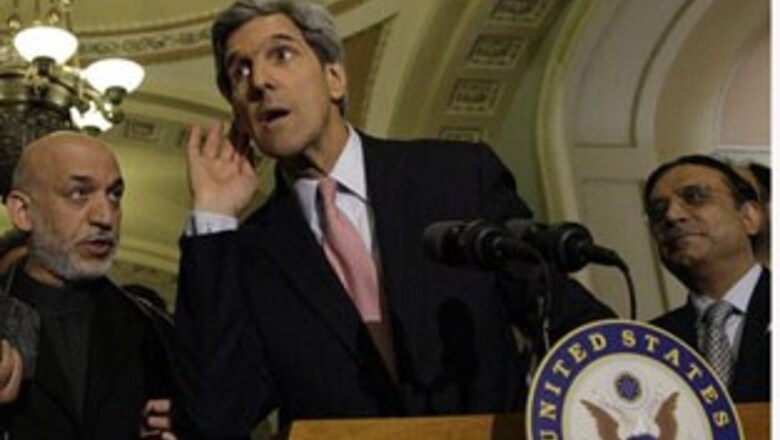
views
Washington: Obama on Wednesday applauded Pakistan and Afghanistan for their commitment to helping the US fight terrorists holed up in their territory, but he also cautioned that the path to success is slow and unsure.
"The road ahead will be difficult," Obama said. "There will be more violence, and there will be setbacks."
Obama added, "The United States has made a lasting commitment to defeat al-Qaeda, but also to support the democratically elected sovereign governments of both Pakistan and Afghanistan. That commitment will not waver, and that support will be sustained."
Pakistan's president offered renewed assurances on Thursday that his country, whose stability is threatened by a rising extremist insurgency, has full control of its nuclear weapons.
President Asif Ali Zardari told reporters after meeting with members of the Senate Foreign Relations Committee that "all of the responsible authorities" in and out of Pakistan "are availed of the situation."
"I have attested to the fact that our nuclear capability is in safe hands," he added.
Senator Richard Lugar, the committee's top Republican and a chief advocate of persuading Pakistan to accept more US assistance in securing its nuclear arsenal, declined during a joint news conference with Zardari and others to comment on the issue. Lugar said he was certain the matter was discussed during Zardari's meeting on Wednesday with President Barack Obama, but he had no details.
A worry expressed by US officials is that Pakistan's political collapse could give the Islamic extremists control of a nuclear weapon. Rep. Ike Skelton, a Democrat and chairman of the House Armed Services Committee, said recently that the Pakistanis have enough fissile material for between 55 and 90 nuclear weapons.
Lugar on Wednesday issued a statement saying an existing Pentagon program, authorized by the Nunn-Lugar Act of 1991 and focused mainly on weapons of mass destruction in the former Soviet Union, should be applied in Pakistan to improve security not only of its nuclear weapons but also its collection of pathogens.
PAGE_BREAK
"Pakistan has many dangerous diseases and pathogens under its control," Lugar said in the statement. "The Nunn-Lugar program can help secure the pathogen strains to ensure they do not fall into the wrong hands."
Zardari and Afghan President Hamid Karzai met over lunch with members of the Senate committee to continue a dialogue that began Tuesday with three-way talks at the State Department, followed by meetings Wednesday at the White House. The talks focused mainly on ways to implement Obama's new Afghan war strategy and on ways to simultaneously fight the insurgency in Pakistan. The issue of nuclear weapons security is a central U.S. concern but not one that is often mentioned publicly in detail.
Senate Foreign Affairs Committee Chairman John Kerry, a Democrat who co-hosted the lunch with Lugar, told the news conference that Zardari and Karzai exhibited a realistic approach to the problem of defeating al-Qaida and allied extremist groups.
"All of the senators who were present today were encouraged by the reality with which both presidents addressed the questions and summarized the challenges," Kerry said.
Secretary of State Hillary Rodham Clinton held back-to-back meetings Thursday with her Afghan and Pakistani counterparts.
Obama's national security adviser, Gen. Jim Jones, told reporters Thursday that Obama was clear in his support for Zardari, who has come under heavy U.S. criticism for doing too little to combat a Taliban insurgency. Clinton, for example, told Congress last week that Pakistan was "abdicating" to the Taliban extremists.
"The president pledged to do whatever we could, to do what we can as quickly as possible to help the Pakistani government, and said this type of aid would not just be restricted to military," Jones said.
Wednesday's meetings had the added complication of reports that U.S. airstrikes on Sunday had killed dozens of civilians in western Afghanistan.
The top U.S. commander in Afghanistan suggested the Taliban might be to blame. Obama expressed U.S. regret, promising to "make every effort" to avoid further tragedies.
At Thursday's news conference Karzai said, without referring directly to the latest controversy, that his country is eager for the U.S. military to find a way to avoid civilian casualties.
"It causes pain to Afghans," Karzai said. "It's something we want to have addressed ... in a manner that will eventually — rather sooner — end casualties for the Afghan people."














Comments
0 comment